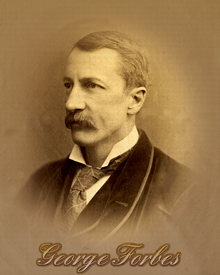Career
In 1873 he was appointed Professor of Natural Philosophy at Anderson's University, Glasgow, (the nucleus of the University of Strathclyde). In his lectures he advocated using electricity to power transportation. His main work at this time, however, was research into the velocity of light.
Arguably his most important work was as a supervising engineer for several pioneering hydroelectric schemes. From 1891 to 1895, Forbes was consulting engineer on the Niagara Falls hydroelectric scheme. He also advised on other schemes, in India (1893), South Africa (1895), New Zealand (1896) and Egypt (1898).
In 1880 Forbes resigned from Anderson's University and moved to London. For the next two decades he devoted himself to electrical power engineering. Commissioned to report on how the City and South London Railway should be powered, he recommended electricity. Soon the entire London Underground would follow his advice. In 1881 he served as a juror at the Paris Exposition Internationale d'Electricite. He was subsequently admitted to the French Legion of Honour.
In 1906 he built a home near Pitlochry to house his library. Forbes's family had frequently holidayed in Pitlochry and his father had befriended the Butters – the area's main landowners – who initially leased and eventually sold Forbes the land on which his house stood. This house, which he called The Shed was a large wooden structure with an observatory on the upper storey. It overlooks the valley that in the 1950s would be flooded to create Loch Faskally and the hydroelectric scheme Forbes had proposed in the early 1900s. In Pitlochry he returned to an earlier interest, from 1906 to 1930 delivering the David Elder lectures on Astronomy at the Royal Technical College in Glasgow.
